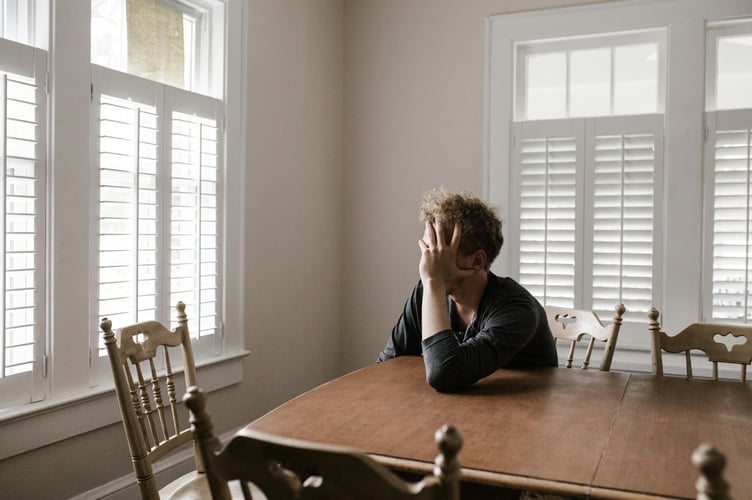A report has warned that the cost of living crisis in Wales is “continuing” and still “taking a terrible toll” on living standards, with hardship “the new normal” as one in seven admit struggling to afford essentials.
New insights gathered by YouGov on behalf of the Bevan Foundation have revealed that families across Wales are continuing to struggle to make ends meet, with around one in seven (15 per cent) sometimes, often or always struggling to afford the essentials.
Figures from the Snapshot of Poverty survey also show that more than four in ten people in Wales (44 per cent) reported their mental health had been negatively affected by their financial position, whilst nearly three in ten (29 per cent) reported that their physical health had been negatively affected over the same period.
A significant minority of families with children under 18 report that they can’t afford activities for their children.
19 per cent of parents reported that their child missed out on joining a sports club or sports lessons outside of school hours in the three months to September 2024, whilst 13 per cent said that their children missed out on a school trip.
The report said this “risks affecting both children’s health and wellbeing, and their educational development, affecting the opportunities in adulthood.”
Three in ten people (30 per cent) in Wales have had to borrow recently as a result of financial pressure, and around one in seven (15 per cent) are in arrears of at least one month on a household bill.
This is “adding extra pressure on household finances and giving people less wiggle room to manage at times of crisis like when a boiler brakes or a car fails an MOT,” the report added.
The report warns that the situation could get worse as approach winter, with 20 per cent of people saying they expect not to be able to afford the basics.
“People across Wales hold out very little hope that they will see an improvement in their living standards in the near term,” the report said.
“With the latest data showing no improvement in the proportion of people that are able to afford the essentials, it is clear that the cost-of-living crisis is still being deeply felt in communities across Wales.”
The Bevan Foundation said there has been “no major changes in how people are coping with the cost of living” since its last report in January where the think-tank argued that “increased financial hardship had become the new normal in many Welsh communities.”
“With no improvement in our latest data, it is clear the stagnation in living standards is continuing,” the foundation’s report said.
“This stagnation in living standards matters.
“The latest data paints a picture of the grim reality of day-to-day life for many people across Wales.
“The longer living standards stagnate at levels which see tens of thousands of people in Wales struggling to afford essentials, the greater the long-term impact on their lives is likely to be, which in turn has a greater impact on public services.”
Speaking on behalf of the Bevan Foundation, Joel Davies said: “The cost-of-living crisis is far from over.
“People are struggling to afford heating, food, and other essentials like clothing and travel.
“Any talk of the cost-of-living crisis being in the past simply doesn’t reflect the reality on the ground for many.”
The report also outlines that financial hardship is “not distributed equally” across different groups.
“For some disabled people, there has been some improvement in the rates at which they report they are struggling compared to results in previous years, but the disparities between those with and without a disability remain glaring,” the report said.
“25 per cent of disabled people whose condition limits them a lot struggle to afford the essentials at least sometimes, compared with 12 per cent of those who do not report that they have a health condition.”
The report said that “the fact that disabled people remain significantly more likely to report that they struggling with the costs of living emphasises how much further progress needs to be made to address inequality in Wales.”
The report found that people in receipt of Universal Credit are the most likely to report that they face significant hardship of any of the groups we have been able to look at in the survey results.
“Almost half of people on Universal Credit (47 per cent) have recently cut down on the size of meals or skipped meals entirely, twice the national average of 23 per cent,” the report found.
The report also found that those who rent their home, especially those who rent from a social landlord, experience hardship at far greater rates than owner-occupiers.
Figures from the survey found that 33 per cent of social renters have recently gone without heating in the home due to cost, compared with 19 per cent of owner-occupiers.
“Whilst the living standards of social renters and owner occupiers have remained broadly stagnant over the course of 2024, the latest figures raise concerns that the position of private renters may be continuing to deteriorate,” the report found.
The report said that parents of children under the age of 18 report that they are also finding it difficult to meet their costs at significant rates.
“This means many children in Wales are going without,” the report said.
“One in five parents (19 per cent) has not been able to afford their children's sports activities outside of school, and 18 per cent have not been able to give their child a birthday party that they wanted. “15 per cent of parents expect not to have enough to cover the essentials for their children in the three months from September 2024.”
The report said: “Financial pressures being experienced by parents are evident in the high rates of arrears and borrowing which they report.
“Well over half of parents (55 per cent) had to borrow because of financial pressure from July to September 2024.”
Figures show that “many people are struggling to afford energy and hygiene costs”, and with an average 10 per cent cost in energy prices since the survey was taken, the foundation raised “real concerns” that people are set to struggle with energy bills over the winter.
Eight per cent of people reported they do not have enough to afford all their basic toiletries, with 15 per cent going without a shower or a bath.
“Together, these results suggest a significant minority in Wales struggle to access adequate basic hygiene essentials due to poverty.”
Close to a quarter (23 per cent) of adults reported in the survey that they either cut down on the size of meals or skipped meals in the previous three months.
Five per cent of people reported they have used a foodbank over the past three months, the findings from the survey revealed.

Food bank usage is also far more common amongst those who have a disability which “limits them a lot”, the report found, with one in ten reporting they have visited a food bank in the three months to September 2024.
The report did say that “one glimmer of hope amongst these results is that the proportion of parents reporting they have cut down on portion sizes or skipped meals for their children has reduced over four surveys.”
“Any progress is welcome, but the fact that one in seven Welsh parents saying that they have had to cut back on food for their children should continue to be a major source of concern,” the report added.
Housing costs are the “most significant cost faced by most households”, the report said.
The report also found that those over-65 were becoming “increasingly concerned about the cost of living.”
“Those aged over 65 have consistently been at a lower risk of hardship than working age adults in our surveys,” the report said.
“However, when looking to the next three months, the proportion of older people who are worried that they will struggle to afford the essentials jumps to 12 per cent.
“A changing policy landscape and increasing energy prices may be providing a source of concern for pensioners in Wales.”
The Bevan Foundation said that more needs to be done at UK Government level to ensure people can afford essentials after changes outlined in the Autumn budget, and called on the Welsh Government to use its cash boost from the UK Government in the budget to help those in hardship.
“The findings demonstrate clearly that the high levels of poverty in Welsh communities will make it significantly harder for the Welsh Government to achieve progress in its priority areas,” the foundation’s report said.
“With the Chancellor's Autumn Statement providing the Welsh Government with some additional funding, it is vital that the Welsh Government uses this to invest in measures that ease the grip of poverty on our communities in both the short and long term in its Draft Budget.”

Steffan Evans, Head of Policy (Poverty) at the Bevan Foundation, responding to the latest figures from the survey said: “The cost-of-living crisis is hitting hard.
“Last week the Chancellor rightly increased investment in public services.
“But without getting to grips with the hardship facing too many families the Chancellor’s ambitions will be undermined.
“Ensuring that all people in Wales are able to afford the essentials is of benefit to everyone.
“Concerningly, the people most likely to report that they struggle to afford the essentials are least likely to get help with their living costs.
“Almost half of people on Universal Credit (47 per cent) cut down on the size of meals or skipped meals entirely in the three months to September 2024, twice the national average of 23 per cent.
“The Chancellor’s reforms to Universal Credit stopped short of guaranteeing that people have enough money to afford all essentials.”
The National Institute of Economic and Social Research, in its the latest quarterly UK Economic Outlook said that lowest 10 per cent of earners will see their tax burden increase by £600 a year as a consequence of the Chancellor’s freeze of the personal tax thresholds until April 2028 in the Autumn Budget, and warned that it doesn’t expect living standards return to pre-2022 levels before the end of 2025-26.
“While we expect aggregate real personal disposable income to grow in 2024-25 and 2025-26, living standards for average UK households will not return to pre-2022 levels before the end of 2025-26, the institute said.
“The hit to living standards is already being felt, with households in the bottom-income decile worse off by around 20 per cent this year compared with the year before the cost-of-living crisis, which amounts to approximately £2,500.
“And, whilst we expect real wage growth to remain strong at around 2.2 per cent in 2025, the effect on the living standards for the bottom 40 per cent of households will be smaller because the costs of rents and mortgages largely cancel out any gains from the real wage growth.”
The report – the eighth poverty survey undertaken by the Bevan Foundation - concluded that the latest findings “demonstrate that life remains incredibly difficult for large numbers of people in Wales.”
“Living standards across Wales are continuing to stagnate and are taking a terrible toll on Welsh communities,” the report said.
“With thousands of people across the nation struggling to make ends meet, the concerns raised by the Bevan Foundation in response to our last Snapshot survey, that higher levels of poverty and financial hardship have become the new normal in Wales, appear to have been well-founded.
“The latest survey findings do offer some small but no less important room for hope.
“The reduction in the proportion of people reporting that they have had to cut back on their heating, and the improvement in the living standards of disabled people whose condition limits them a lot does show that there is nothing inevitable about such high levels of hardship in Welsh communities.
“It is important that these small improvements are not exaggerated, however.”


.png?width=209&height=140&crop=209:145,smart&quality=75)

